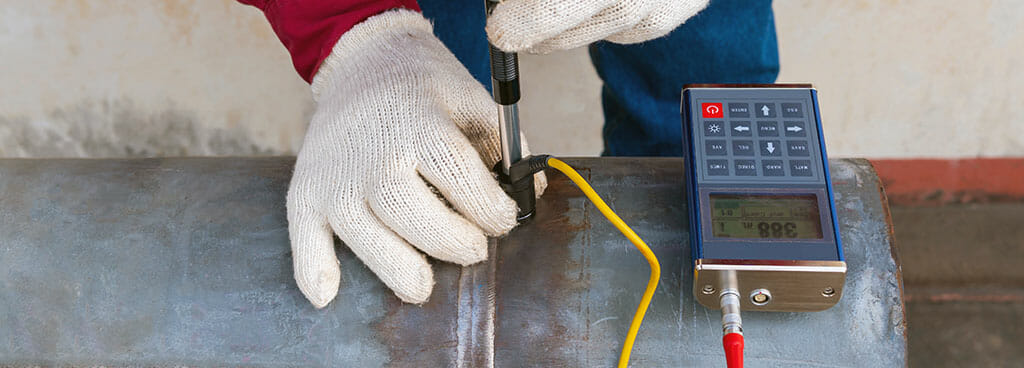- Home
- Services/IndustriesServicesindustries
- About Us
- LocationsStatesAccordion ContentAccordion ContentAccordion ContentAccordion Content
- Job Openings
- Quick Links
- ATS Family

Nondestructive Hardness Testing
Applied Technical Services’ metallurgy lab performs nondestructive hardness testing services. We employ technicians with decades of shared experience in nondestructive hardness evaluations, litigation support, failure analysis, and other metallurgical services.
What is Hardness Testing, and Why is it Important?
Hardness tests determine a material’s strength, wear resistance, ductility, and resistance to permanent deformation or indentation. Hardness tests are a favorite amongst manufacturers because they are often quick, cost-effective, and versatile. Nondestructive tests provide information on a material’s mechanical properties, which are essential in materials testing, quality control, and failure analysis. Hardness tests also allow manufacturers to forecast a material’s performance in environments where factors such as friction or environmental erosion are likely to occur.
Nondestructive Hardness Testing
ATS offers the following nondestructive hardness tests.
Leeb Hardness Test
The Leeb determines a material’s hardness by calculating the energy lost by an impacting body after it impacts the metal sample. Harder samples cause the impact bodies to react more quickly than softer samples. Advantages include:
- Portable
- Cost-efficient
- Yields Highly Accurate Results
Ultrasonic Hardness Test
Ultrasonic hardness tests use ultrasonic contact impedance uses a measurement probe to measure the hardness of materials. The technology allows users to yield results while applying less testing force than other methods. Advantages include:
- Quick Application
- Results are Digitally Saved for Further Review
- Ideal for Tight Spaces or Hard to Reach Surfaces
Destructive Hardness Testing
ATS also conducts several destructive hardness tests, including:
The Brinell hardness test determines the hardness of materials with rough surfaces or abrasive textures. Our experts use a 10mm steel ball to apply a predetermined force to the material’s surface for a specified amount of time. We calculate Brinell hardness by factoring in the applied force and the diameter of the ball and indentation.
The Rockwell hardness tests determine a material’s hardness by measuring the depth of an indentation caused by a steel ball indenter. The test provides quick results and is especially useful when testing large samples.
The Knoop hardness test determines a material’s hardness by measuring the diameter of an indentation caused by an elongated pyramid-shaped indenter. The Knoop test is ideal for fragile and brittle materials because of its sensitivity to surface conditions, but the method works on both soft and hard materials.
The Vickers Hardness determines a material’s hardness by measuring the depth of the indentation caused by a diamond-shaped indenter. The Vickers test yields highly accurate results and applies to soft and hard materials.
ASTM Standards
- ASTM A370
- ASTM A956
- ASTM E10
- ASTM E18
- ASTM E92
- ASTM E384
- ASTM D785
- ISO 4545
- ISO 6505-1
- ISO 6506
- ISO 6508
- ISO 9016-2
Applied Technical Services Metallurgy Lab
ATS’ metallurgy lab conducts tests on several types of metals, including:
- Aluminum (anodized)
- Brass
- Cadmium
- Chromium
- Copper
- Gold
- Nickel
- Siler
- Tin
- Zinc
- Zinc Iron
Our experts uphold the latest testing standards and practices while working closely with clients to ensure that our services meet the needs of their projects. Call +1 (888) 287-5227 to receive a free quote for our nondestructive hardness testing services.

Request Form
"*" indicates required fields
Complete List Of Metallurgy Links
- 3D Inspections
- 3D Part Inspection
- 3D Scanning Services
- 3D X-Ray Imaging
- 3D X-Ray Services
- Computed Tomography
- Computed Tomography Lab
- Computed Tomography Metallurgy
- Computed Tomography Scanning
- Computed Tomography (CT) Services
- CT 3D Scanning for Reverse Engineering
- CT Inspections
- CT Lab
- CT Metrology
- CT Scan Companies
- CT Scan Parts
- CT Services
- First Article CT Scanning
- X-Ray Microtomography
General Services
- EDS Chemical Analysis
- Litigation Support
- Material Identification
- Metallography Lab
- SEM Lab
- Metallurgical Services
- Nondestructive Hardness Testing
- Porosity Analysis
- PPE Testing
- Reverse Engineering Services
- Scanning Electron Microscopy
- Scanning Electron Microscope Services
- Tensile Testing Metallurgical Lab
Metals Testing and Metallography
- Brinell Hardness Tests
- Case Depth Hardness
- Case Depth Testing
- Fracture Analysis
- Fracture Surface Analysis
- Grain Size Analysis
- Grain Size Distribution
- Hardness Testing Labs
- Hardness Testing Services
- Intergranular Corrosion Tests
- Knoop Hardness Testing
- Laser Grain Size Analysis
- Metal Tests
- Metal Fracture Analysis
- Metallurgical Testing Services
- Metallography Lab
- Metallography Microstructure and Analysis
- Rockwell Hardness Tests
- Superficial Rockwell Hardness Tests
- Vickers Hardness Test
